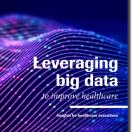Building digital infrastructure to scale AI-powered screening solutions

Photo: shapecharge/Getty Images
Healthcare organizations are leveraging AI-powered solutions to support better patient outcomes in multiple areas, including for screening and early disease detection. To date, the FDA has approved more than 1,000 algorithms for healthcare use, many of which are tied to early disease detection.1
To gain the most value from these AI tools, including algorithms that can identify patients at risk for certain cancers and other chronic conditions, healthcare organizations need seamless data integration and strong cybersecurity. Such interoperability, however, remains challenging for organizations struggling to incorporate AI solutions into increasingly complex IT systems. “Data fluidity is becoming so important,” said Okan Ekinci, cardiologist and global head of digital technology and CMIO at Roche Information Solutions. “Why? Because we need to make sure AI-based medical algorithms can access the right data for all patients at the right time.”
As healthcare becomes more decentralized in the U.S., interoperability is critical for aggregating data from disparate sources to provide a longitudinal view of patients’ medical history and possible risk factors. “The healthcare of the future is all about connected integrated systems … [providing] hyper-personalized and precision-based care,” added Sunil Dadlani, executive vice president, chief information and digital transformation officer and chief cybersecurity officer at Atlantic Health System. “Data, interoperability and cybersecurity are fundamental key challenges that we must resolve” in order to adopt and scale these systems, including AI screening algorithms.
Organizations can successfully implement AI-powered screening solutions by combining clear frameworks with strategic data integration. AltaMed Health Services, a federally qualified independent community health center in Southern California, demonstrated this approach’s effectiveness by using AI to integrate claims data across 13 health plans and improve outcomes across its value-based care model. This reduced redundant testing by 30%, according to Raymond Lowe, the organization’s senior vice president and chief information officer. “In the current financial climate of declining revenue … we need to be very thoughtful of how effectively we are using our tools,” he noted.
Successful implementation of AI algorithms requires a robust governance process, Dadlani noted, including cross-functional leadership representing different service lines like legal, compliance, finance and technology. Organizations must also understand their patient population’s demographics and projected health needs. “You have to have a good view of the communities you serve, how there is a shift in terms of case mix related to your demographic shift,” he explained.
By keeping those demographics in mind, Lowe said that analytics could help leaders demonstrate AI screening tools’ potential population health benefit. “Look at what the quality drivers are and tie that to what areas [of care] are very expensive,” he advised, emphasizing the need to align AI implementation with clear business objectives and value-based care goals. Focusing on the quadruple aim can help health systems most effectively make the case for deploying such tools to enhance patient outcomes.
According to Ekinci, Roche is supporting healthcare institutions’ efforts to implement and support AI solutions by developing platforms that address cybersecurity and data privacy concerns. These platforms can bring together multimodal data to support clinical decision-making but require human oversight in their design and use. “We need to make sure people are involved [in developing medical algorithms],” Ekinci concluded. “Our purpose is definitely to create actionable knowledge that improves care, with the quadruple aim or value-based health care behind as a backdrop.”
See the full webinar here: https://event.on24.com/wcc/r/4792818/01D002265DA6CAF159765F27F33C388D
- U.S. Food & Drug Administration. Dec. 20, 2024. Artificial intelligence and machine learning (AI/ML)-enabled medical devices. https://www.fda.gov/medical-devices/software-medical-device-samd/artificial-intelligence-and-machine-learning-aiml-enabled-medical-devices.

































